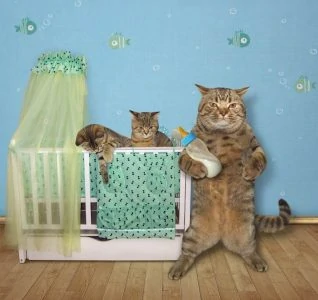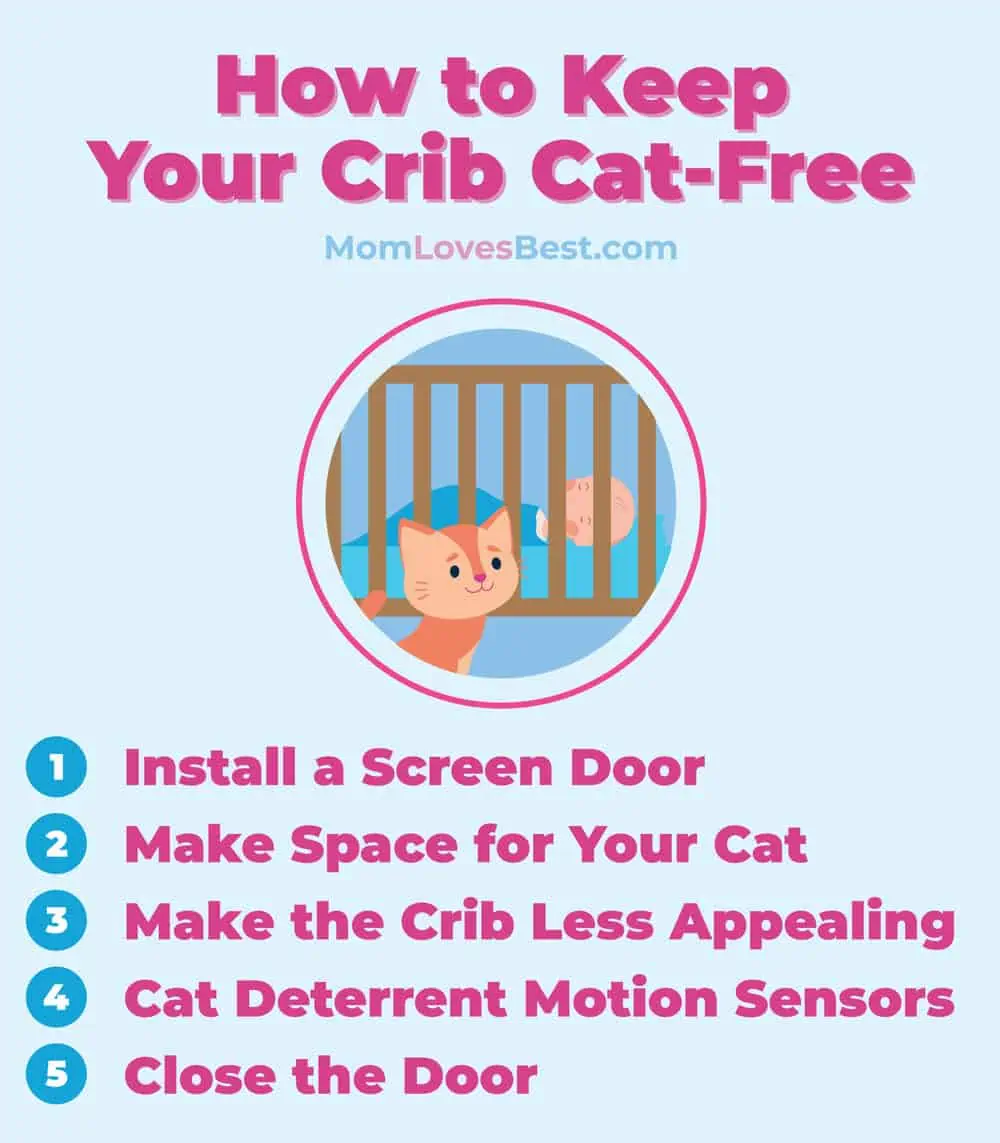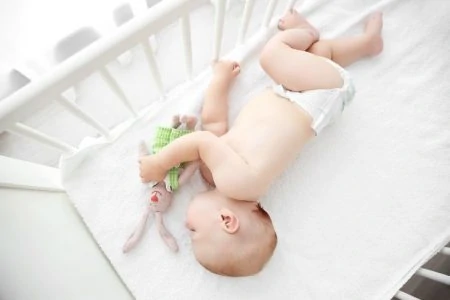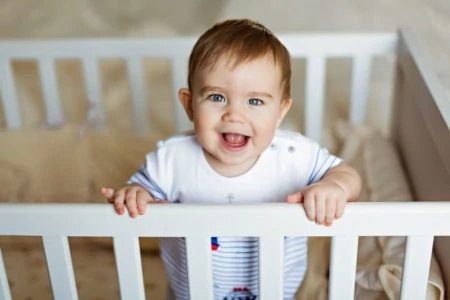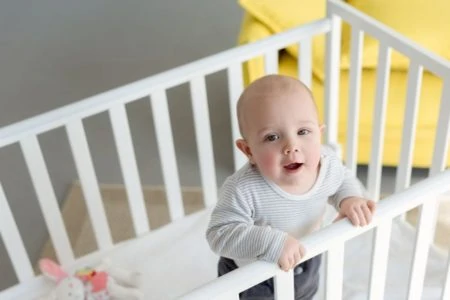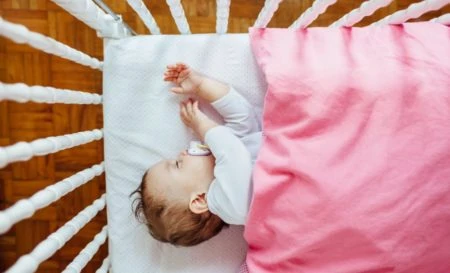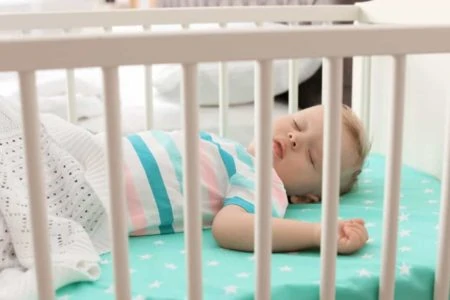If you’re a cat mama and a new baby mama, you’ve probably already discovered that there’s something about a nice, firm crib mattress that seems to attract cats from the first moment.
And although it’s cute to find your little four-legged friend dozing like a baby in the crib, it’s disconcerting if your baby happens to be dozing in their bed at the same time. We know this from experience!
But there’s no need to worry. Eliminating risk and creating a safe, harmonious environment for your fur baby and your human baby is completely possible.
In this guide, we’ll discuss all the methods you can use to keep your cat out of your baby’s crib.
Key Takeaways
- Prepare your cat for the baby by introducing new scents, sounds, and creating a quiet space for them.
- Keep the crib cat-free by installing a screen door, providing an alternative spot for your cat, and making the crib less appealing.
- Avoid using crib nets, peppermint oil, and excluding your cat from family activities.
- Encourage supervised interaction between your cat and baby to foster a safe and harmonious environment for all.
Can Cats and Babies Co-Exist?
Cats classically have a reputation for being territorial, fussy, unpredictable, and jealous. Not all of them are this way, and many cat moms know this — but they also know the cat was around the house first.
So, can a cat accept the arrival of a new, noisy human in their kingdom? Of course, they can! Think about all the different ways you’d prepare an older child for the arrival of a younger sibling, or maybe how you’d introduce a new pet to an existing one.
Taking steps to familiarize your cat with your newest family member and teaching them early on to avoid the crib and your baby’s other areas is the best way to ensure they exist together safely (1).
Preparing Your Cat for Baby
Start now! Spending the duration of your pregnancy preparing your cat for the baby and establishing off-limits areas can make the transition seamless and simple. Start with showing them new scents, and practice by introducing things to your cat slowly.
If you already have your newborn, you can still follow these steps.
By nature, cats are curious. They have a very similar curiosity to that of a child, which will make them great companions in the future.
Addressing some of your cat’s curiosities before the baby arrives can help keep the kitty out of the crib:
- Scents: What do babies smell like? Your cat will want to know. Bring out the baby products, like baby lotion, powder, or a special shampoo. Use them around the house so your cat will associate the new baby smells with their everyday life.
- Sounds: New sounds are one of the most stressful changes for a cat, so start slowly with a monitored, careful introduction. Playing baby sounds you find on the internet may help do this. When your baby cries or coos, it won’t surprise the cat.
- Space: As loving as our cats can be, they also need peace and quiet. Prepare a quiet, secure area where they can hide out when they feel the need.
This will help make all these new things familiar to your cat, reducing their curiosity and urge to jump into the crib to investigate.
How to Keep Your Crib Cat-Free
You should explore different options for keeping your cat-free areas safe before the baby arrives. But there are ways to solve the problem of your cat intruding after you and your baby have come home.
Consider these options and see what works for you and your family.
1. Install a Screen Door
Including your cat in your baby’s presence will make the whole experience seem less stressful for them, so allow them the opportunity to supervise the baby from afar.
A screen door in the nursery will give your cat a good view and a way to smell your baby without risking them getting into the crib. This is a better option than crib nets, which may be dangerous (2).
2. Make Space for Your Cat
More than anything, your cat will be curious about your baby. As intelligent creatures, they see how important this baby is to the family, and they’ll want to be close.
Give your cat an alternative to sleeping in the crib by setting up a perch or bed on the other side of the room.
3. Make the Crib Less Appealing
Before the baby arrives, you can put uncomfortable, noisy items into the crib, such as a flat layer of tinfoil or baby crinkle toys. Each time your cat jumps in, they’ll be greeted by startling sounds and no cozy place to sleep.
They’ll eventually decide the crib is not a prime napping spot and will leave your baby in peace when you bring them home.
4. Cat Deterrent Motion Sensors
While other methods are less stressful to the cat, cat deterrent motion sensors can be a quick way to train your cat if you’re running out of time before the baby comes home.
These devices work as a spray form or an ultrasonic sound meant to startle and deter your cat away from the designated area.
5. Close the Door

If nothing else seems to be working and your cat keeps finding their way into the crib, it might be time to start closing the door. Investing in a video baby monitor can help make this an easier choice.
Excluding your cat from this part of your life shouldn’t be the first thing you try, and with some patience, they should learn what message you’re trying to convey to them.
3 Things To Avoid
Many well-meaning cat parents have tried various methods without realizing the potential dangers they could impose. Recognizing the risks of these methods is important for the safety of your cat and your baby.
1. Crib Nets
While these contraptions may seem like the obvious method for preventing your cat from getting inside the crib, they can be very dangerous for your baby. The fabric could fall into the crib, especially if your cat messes with it, causing your child to get strangled in the mesh (3).
2. Peppermint Oil
Many people will suggest putting peppermint oil on everything that belongs to your baby. Cats hate it, and they have good reason! Peppermint oil is very dangerous to cats and should be avoided. It can cause tummy problems or pneumonia (4).
3. Excluding Your Cat
Try to put yourself into your cat’s place and understand how all these changes make them feel. Even cats who react poorly to a new baby by acting out and getting anxious or stressed should be included in the family.
Don’t lock your cat away from your baby. Instead, focus on supervised moments together.
FAQs
Avoid Cat-astrophes
Your cat is an important part of the family, and a new baby doesn’t have to change that.
Take the steps together as a team, both pet and human, to ensure a safe, happy, and purr-fect environment for everyone.
Try introducing your cat to the sounds and smells of a new baby, and create designated safe zones so they can get some peace when they need it.
